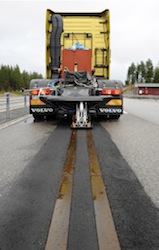 As gas prices continue to jump up at the pump, the future of electric vehicles is looking bright. The Volvo Group is working on improving electric vehicles and looking for more solutions for vehicles to operate on renewable energy. The company has proposed a future where trucks and buses and continuously supplied with electric power but without batteries. Rather, power lines are built into the surface of the road.
As gas prices continue to jump up at the pump, the future of electric vehicles is looking bright. The Volvo Group is working on improving electric vehicles and looking for more solutions for vehicles to operate on renewable energy. The company has proposed a future where trucks and buses and continuously supplied with electric power but without batteries. Rather, power lines are built into the surface of the road.
Mats Alaküla, Volvo Group’s expert on electric vehicles and professor at Lund University notes that a challenge is supplying a vehicle with electrical power when needed. “In city traffic, there are currently various solutions and we are researching many others. We have field tests in progress where our plug-in buses are equipped with a battery that can be charged quickly when the buses are at bus stops.”
However, Alaküla notes that using batteries to power trucks and buses traveling long distance will not work. These vehicles stop infrequently and would need so many batteries there would be no room for loads or passengers. This is why the company is searching for a solution to constantly provide power to a truck or bus from an external source through its participation in a large Swedish research project with the support of the Swedish Energy Agency.
The method currently being developed and tested by the Volvo Group, together with Alstom, entails two power lines built into the surface of the road along the entire length of the road. A current collector in contact with the power lines will be located on the truck. With this method, electric vehicles could be continuously supplied with power without carrying large batteries explains Alaküla. The power line will be built in sections and one section is only live as the truck passes.”Last year, Volvo built a 400-meter long track at its testing facility in Hällered outside Gothenburg. The company has been testing the system since last autumn. The electricity flo ws into a water-cooled heating element, with similar power requirement as an electricity-driven truck,” explains Richard Sebestyen, who is the project manager at Volvo Group Trucks Technology, which is the Volvo Group’s research and development division.
ws into a water-cooled heating element, with similar power requirement as an electricity-driven truck,” explains Richard Sebestyen, who is the project manager at Volvo Group Trucks Technology, which is the Volvo Group’s research and development division.
However, a great deal of research still remains before this can become a reality. It involves the continued technical development of the current collector, electric motor and the control systems required. It also involves road construction, road maintenance, electricity supply along the roads and various payment models, etc. The team working on the project believes that to create solutions for the future, companies must invest heavily in research today. And Alaküla is confident that they will find a cost-efficient way to supply electricity to vehicles in long-distance traffic.

